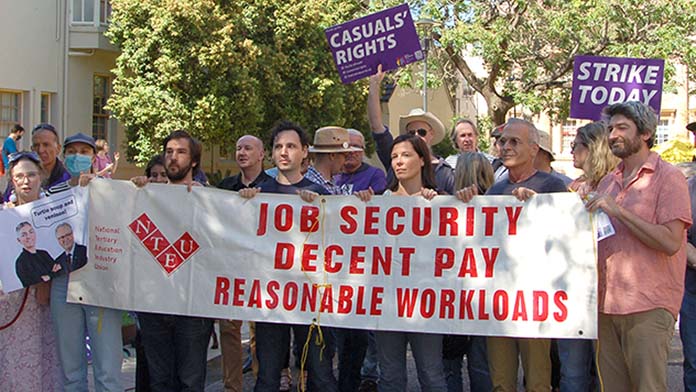Staff at the University of Sydney staged their eighth day of strike action on Friday. It followed the biggest mass meeting of the campaign so far where more than 700 members voted to reject management’s latest offer and to hold two more days of strike action. Members of the NTEU branch will strike again this Wednesday (5 April).
The struggle shows the commitment of staff to win all of our demands and the role that rank-and-file organisation can play in building militancy.
After a mammoth 19 months of bargaining, the determination to continue striking has won some of the union’s key demands.
For the first time in the sector, the union has won a commitment for casual staff to receive five days of paid sick leave per annum. And, after over a year, management has finally conditionally withdrawn some of its key attacks, such as the attack on the 40:40:20 workload allocation for academic staff (limiting teaching to 40 per cent and ensuring 40 per cent research time), and extended redeployment for professional staff.
After seeing our wages go backwards as a result of high inflation, the union has won an increase from a 14.6 per cent pay rise to a 16.1 per cent pay rise over the life of the agreement. On an agreement to agreement basis, this is the best wages outcome in the sector, at 3.7 per cent per annum.
Staff have won working from home protections and a clause that casual academic staff will be paid for every hour they work.
In previous bargaining rounds, many academic members have voted to cease striking after the union has stopped management’s long-sought attacks on academic workload allocations. In 2017, at a similar point in the campaign, the majority of a 450-strong meeting voted to accept management’s limited offer. Now in 2023, a majority of an unprecedented 700+ person members meeting voted to continue the strikes!
Strike demands
There is still plenty to fight for.
Management are seeking a massive expansion in so-called “education-focused roles”, academics with crushing teaching workloads that are generally impossible to complete in a 40-hour week during semester. This would mean a teaching load 75 per cent greater than normal and no right to convert to a conventional workload for five years.
This has been met with particular anger because of the way it would destroy the “research-teaching nexus”, the principle that teaching at the university level should be linked to the latest research and academic staff given time to perform both teaching and research.
After years of simmering resentment, this has suddenly become a major issue, resulting in multiple circulating email threads about the issue.
The university can also afford to deliver more over pay. Sydney University is an extremely rich institution, posting a surplus of more than $1 billion in its most recent annual report. But management’s new pay offer is still behind inflation. By 2026, workers would still be more than 2 per cent behind their 2021 pay in real terms.
Shamefully, management has also refused to commit to an enforceable target for First Nations employment parity. The union has been demanding that the university address institutional racism and commit to a target of employing Aboriginal and Torres Strait Islander staff to match their proportion of the population. Management has currently committed to just 2 per cent of employment by the end of the agreement.
Why the political shift?
Attempting to learn the lessons from the 2017 campaign, union members set up Rank and File Action (RAFA) in 2022, a group committed to strengthening rank-and-file organisation across the university and building a fighting union.
RAFA used the branch elections to campaign for member support for a serious campaign in the up-coming enterprise bargaining round and won a significant number of positions on the NTEU branch committee.
But much more than elections, RAFA has been focused on basic union organising, building local union fights, throwing its energies into NTEU stalls and leafleting, and building strong picket lines at the university entrances on strike days. Additionally, RAFA has produced regular bulletins, distributed at union meetings and in workplaces, to expose management lies and argue for the next steps of the campaign while reporting instances of successful local union organising.
These forums, leaflets and bulletins have been instrumental in winning members to a credible fighting politics and encouraging members to build the union and build the strikes.
This has been crucial to the success of the strikes so far. While the Sydney University NTEU branch is among the strongest in the country, union density is still only around 15 per cent. The pandemic saw the university impose major job cuts and disrupted basic union organising. Pulling off eight strikes to date over such a long campaign has been a major achievement.
Union members are striking again on Wednesday 5 April. Momentum is growing behind union demands, which are cutting through the management spin.
But there is still a battle ahead to defeat the militant university management. Union membership has grown since the beginning of the campaign to historic levels but will need to continue to grow and bring even more people into action against management.
Every local area needs union activists to build the local fights and connect them back to the broader union strike campaign.
People can support the campaign by joining the Sydney Uni picket lines on Wednesday 5 April or donating to the strike fund.
The lessons of the possibilities of rank-and-file union organising should also be an inspiration to workers fighting the same inflation and neoliberal crises across the country.
By Sophie Cotton






